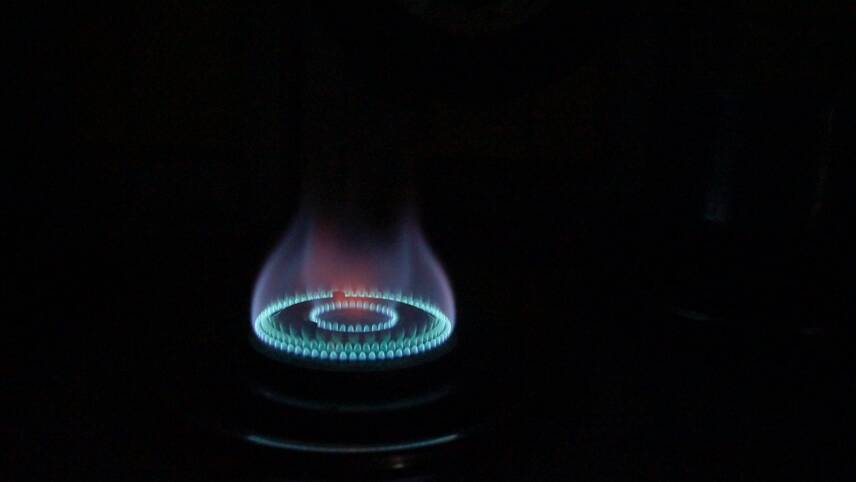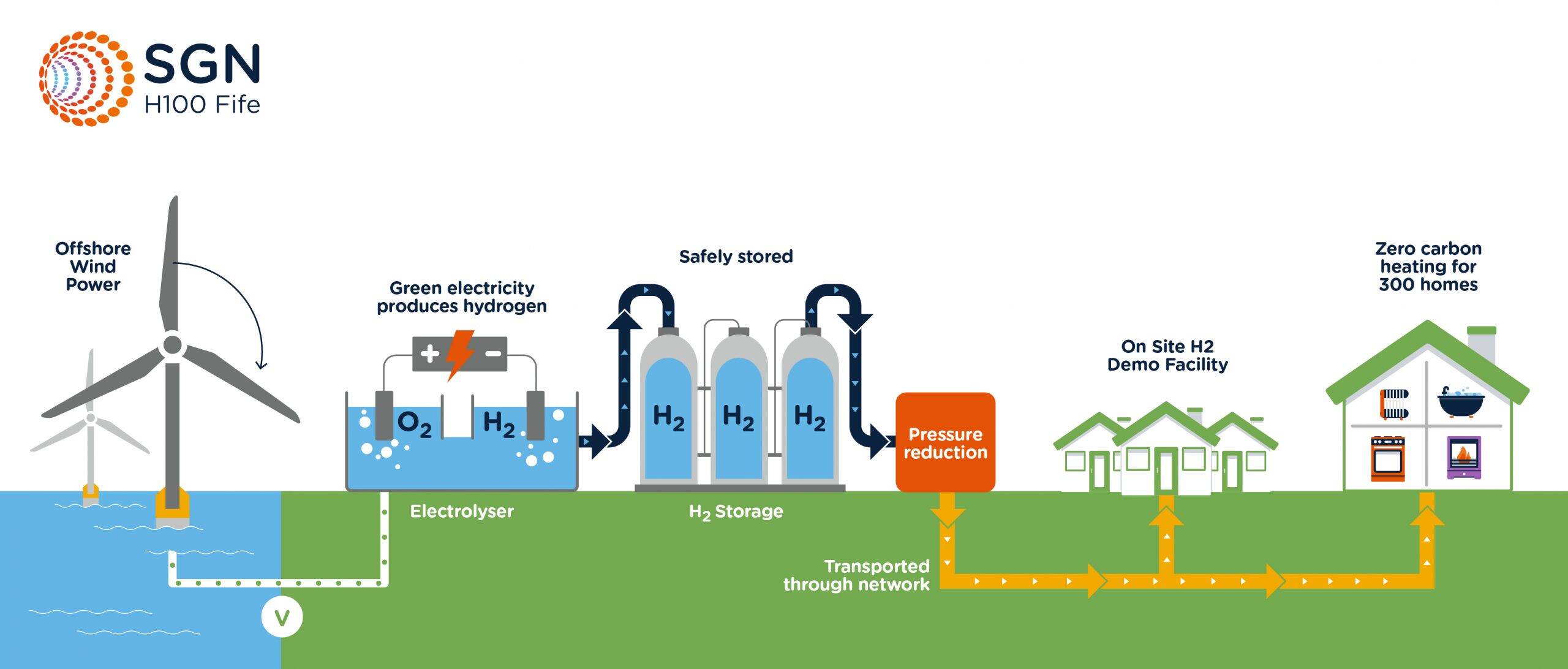You’ve reached your limit!
To continue enjoying Utility Week Innovate, brought to you in association with Utility Week Live or gain unlimited Utility Week site access choose the option that applies to you below:
Register to access Utility Week Innovate
- Get the latest insight on frontline business challenges
- Receive specialist sector newsletters to keep you informed
- Access our Utility Week Innovate content for free
- Join us in bringing collaborative innovation to life at Utility Week Live

As SGN acquires the electrolyser for its ‘world-first’ green hydrogen project in Fife, Utility Week Innovate takes a closer look at what’s being described as a ‘blueprint’ for decarbonising heat.
It’s fair to say that in the 12 months since the prime minister unveiled some of the most ambitious proposals for growing Britain’s hydrogen economy to date – including the commitment to a ‘hydrogen village’ by 2025 – hydrogen’s blue, or green, touch paper has been well and truly lit.
In July, for instance, it was announced that the gas was to be blended onto a public gas network for the first time in the next phase of the green £22.5 million HyDeploy project, with plans for what its developers claim will be the UK’s first commercial-scale, low-carbon hydrogen fuel hub submitted barely a month later.
What’s more, the UK government’s Hydrogen Strategy forecasts demand reaching 35 percent of UK final energy consumption by 2050, with Britain’s first Hydrogen Village Trial poised to pipe the gas to a statistically representative customer base of up to 2,000 occupied homes, offices and other buildings – all of which will use 100% hydrogen for a period of at least 12 months.
In fact, the scale of opportunities hydrogen innovation can deliver over the coming decade is such that Great Britain’s five gas networks recently predicted their projects would create more than 13,000 direct jobs over the next decade – as well as more than 11,000 in supply chains.
‘World first’
SGN – which provides gas to approximately 5.9 million homes and businesses in the south of England and across Scotland – has also announced its H100 ‘Neighbourhood Trial’ in Fife.
In early October, the firm signed an agreement with hydrogen technology provider Nel ASA to supply the electrolyser for what it claims is a “world-first” hydrogen-to-homes heating network in Levenmouth on the east coast of Scotland.
The project aims to demonstrate 100% green hydrogen heating in an initial 300 homes and will see the construction of a hydrogen production, storage and demonstration facility at Energy Park Fife in Methil.
Eligible households will have the choice to switch to hydrogen, or remain with their existing natural gas supply. Customers who opt-in to the project will have their home supplied with hydrogen for heating and cooking through a new distribution network in 2023.
According to SGN, the initial 300 homes joining the project will receive a free hydrogen connection, free replacement hydrogen appliances and free maintenance over the length of the project. They will also pay the same amount for hydrogen gas as they would pay for natural gas.

Minimal change of disruption
H100 Fife has also pledged to use electricity from the Offshore Renewable Energy Catapult’s nearby offshore wind turbine to generate the hydrogen via electrolysis. According to SGN, the 5MW alkaline water electrolyser provided by Nel will deliver up to 2,093kg of green hydrogen per day.
The project’s 100% green hydrogen will then be stored and transported to provide zero carbon heating for the project demonstration facility and customer homes.
SGN director of energy futures, Angus McIntosh, described the agreement with Nel as a “milestone achievement” towards delivering the H100 Fife project. “We’re delighted to be working with global leading partners like Nel who share our vision to drive a sustainable energy transition,” he said.
“Hydrogen can allow us to decarbonise homes with minimal change or disruption to how customers heat their homes. We believe this is will be a crucial factor in delivering our net zero targets as quickly as possible.”
The new Nel electrolyser will be installed in Energy Park Fife in 2022. Once up and running, the project will be operational for approximately four-and-a-half years until March 2027.
Blueprint for decarbonising heat
According to project manager Lorna Archer, SGN ran a competitive tender process for the H100 Fife hydrogen electrolyser which began in 2020 and concluded with Nel ASA being appointed in September 2021.
“H100 Fife offers a blueprint for decarbonising heat by providing a foundation that is replicable and scalable,” Archer tells Utility Week Innovate.
“The planned future expansion phases of H100 Fife intend to diversify the end user application to commercial, industrial and transport sectors with the overall ambition of delivering a whole system solution for hydrogen in Fife.”
Explaining that the customer opt-in feature of H100 is “key”, and provides SGN with a unique opportunity to understand customer appetite and social acceptance of hydrogen in a real-world demonstration, Archer adds that the firm has strived to ensure customers are able to make an informed choice on whether they wish to participate.
As such, the firm has proposed a demonstration facility to allow customers to see and experience hydrogen appliances in a home-like setting before opting in.
“Hydrogen awareness and education is a critical component of our engagement plans both for the customers who decide to opt-in and more generally in the local community and for our local stakeholders,” she says.
“Rolling out education and awareness about hydrogen and our project is something that we hope will help to build confidence in hydrogen for those that are not familiar with it’s potential for decarbonisation and allow people to feel empowered about their choices on how to heat their homes.”
There goes the neighbourhood
Ultimately, Archer views the H100 project as an opportunity to validate the extensive hydrogen evidence base that has been developed collaboratively across industry in what she claims is a “first-of-a-kind” demonstration.
“We have developed H100 Fife Phase one in order to produce key learnings and outcomes that could help to inform heat policy decisions, which in turn will determine how the UK intends to decarbonise heat in a move to net zero,” she says.
However, a degree of reluctance remains, with Utility Week recently reporting that an energy minister described himself as a “hydrogen sceptic” and said the costs of producing the gas mean it is “pretty much impossible” to see it being used in mass home heating.
As such, Archer adds that while H100 Fife Phase one is on track as the ‘Hydrogen Neighbourhood’, challenges remain with regards to a broader rollout.
“Timescales to deliver in order to be able to inform heat policy decisions remain ambitious but necessary in order to help the UK reach net zero targets,” she says.
“Regulatory frameworks need to be navigable in line with the hydrogen trials programme requirements and timeline. This is currently being consulted on across industry and government.”
 See this content brought to life at Utility Week Live, 17-18 May 2022 NEC Birmingham
See this content brought to life at Utility Week Live, 17-18 May 2022 NEC Birmingham
Decarbonising heat is one of the frontline challenges at the heart of Utility Week Live 2022’s live content programme.
View the challenges and be alerted for tickets to the industry’s most eagerly awaited reunion at utilityweeklive.co.uk.
Please login or Register to leave a comment.